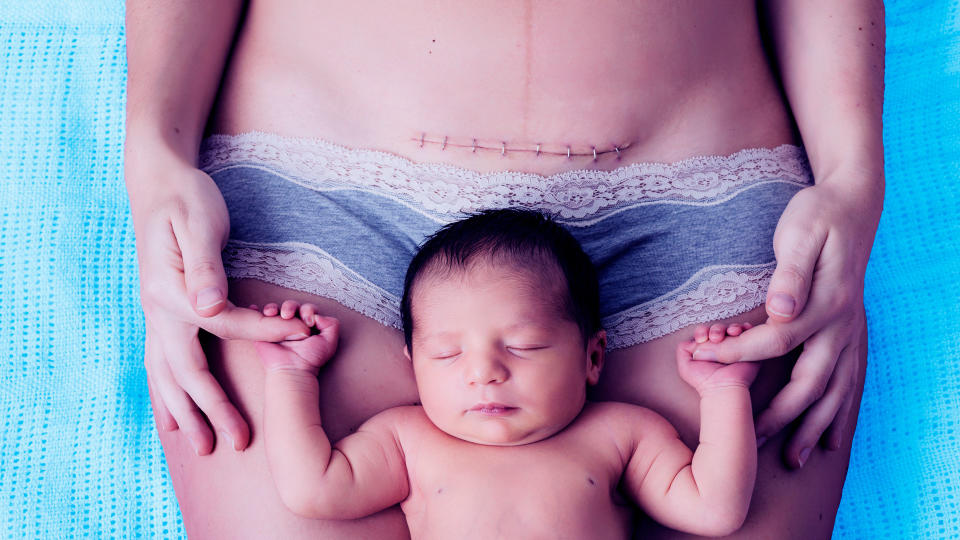I Regret Not Switching OB/GYN's Mid-Pregnancy

Click here to read the full article.
I was bullied into a c-section with my firstborn. My water broke in the early hours of the morning, so my husband and I trekked to the hospital. The nurses pumped me full of Pitocin, then an epidural, and as my OB said, I “failed to progress.” He had only given me 18 hours after my water broke before delivering the big c-section news.
But now, after immense research and interviews with other OBs and midwives, I know that my body still had plenty of time. My bullied birth experience left me traumatized — and made the beginning months of motherhood a dark fog. Thankfully, I switched healthcare providers before getting pregnant with my second child, because I desperately wanted a VBAC. But honestly, I wish I would have switched sooner.
More from SheKnows
I do take partial blame for my treatment during my first pregnancy and labor. It was my fault I didn’t do my homework. In my naïve head, I figured, “Welp, it’s childbirth — it’s going to hurt and there’s nothing else I can do about it.” I couldn’t have been more wrong. During my pregnancy, my appointments within my OB practice went fine, but they were far from intimate or bonding. I felt like a number, and to the doctor, I likely was. While I thought about finding a new OB or even switching to a midwife midway through that first pregnancy, I didn’t really think I could.
However, after chatting with the gracious Lindsey Meehleis, founder and director of OC Midwifery, she said that while it takes great courage to switch healthcare providers during or even between pregnancies, it’s absolutely possible — and often a good idea. She did admit, however, that it can be difficult to switch nearing the end of pregnancy, because as a midwife, she hopes to really connect with her patients by providing them with intimate care throughout the process.
“In an ideal world,” Meehleis said, “it would never be too late to find a new healthcare provider who honors your birthing wishes, but it can be complicated.”
Meehleis said that it is easier for women to switch in the middle of pregnancy if they have already had a vaginal delivery, but for first-time moms and those attempting a VBAC, it can get tricky. You see, if you’ve already delivered vaginally, the mother mentally knows she can give birth vaginally and her body has already experienced that. But because of the unknown with first-time moms and those hoping for a VBAC, it may be wise to switch earlier within your pregnancy.

Meehleis did stress that pregnant women always have options — regardless of where they are in their pregnancy. “I’ve even seen women fire their OBs during labor,” she said (yikes!). Meehleis also stressed the fact that women can demand a patient advocate during labor. Obviously, it is best to do your research beforehand and switch providers much sooner. Still, patients should always know their choices.
During our conversation, Meehleis said something that really struck me: “In general, people often spend more time researching for a new car or planning their wedding [than they do] the birth of their baby.” And she’s right. If I would have researched before I got pregnant or even during my pregnancy like I did after my c-section, I likely wouldn’t have had to endure what I did.
Meehleis advises all women to research everything they can about prenatal care and birth. Then, during your pregnancy, “If you’re being told something that just doesn’t sit right, you can research other healthcare providers.”
I’ve realized that I shouldn’t suffer from any kind of guilt for the mistake I made in not switching OBs. Because that c-section fueled me with the ability to empower myself. I’m so glad that I did my research before getting pregnant a second time; I found an OB practice with a midwife who genuinely cared about my wellbeing. With her, I could ask 10 questions during one appointment, and she just sat at ease, giving me her time. I no longer felt like a statistic. When I finally went into labor, I was mentally ready and strong. I knew I wanted a VBAC and was willing to fight to get it.
And I did. After 50 grueling hours of labor and three hours of pushing, my daughter was born five days late. As my midwife laid her on my naked chest, I felt my own power echo all over the room and into my daughter.
Switching practices was the best decision I have ever made for my body and my mental health. Finally, I was brave enough to listen to myself — that tiny voice inside me that had spent my first pregnancy and birth experience screaming, This doesn’t feel right. Because when I made the switch, I was able to have the birth I had always wanted.
For more important how-tos when you’re expecting, here are the only pregnancy books you actually need to read.
Launch Gallery: The Only Pregnancy Books You Actually Need to Read
Best of SheKnows
Classic, All-American Baby Boy Names That Still Have Impact in 2020
Bye, 'Granny' — Introducing the Non-Boring Grandparent Nicknames You Need
5 Really Good Reasons to Practice Toy Minimalism at Your House
Sign up for SheKnows' Newsletter. For the latest news, follow us on Facebook, Twitter, and Instagram.

